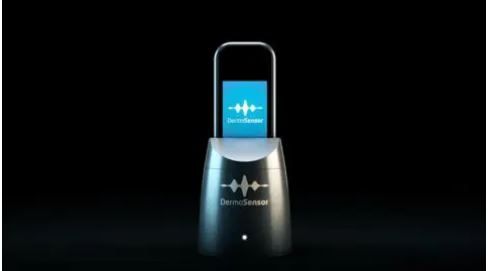- Clinical Technology
- Adult Immunization
- Hepatology
- Pediatric Immunization
- Screening
- Psychiatry
- Allergy
- Women's Health
- Cardiology
- Pediatrics
- Dermatology
- Endocrinology
- Pain Management
- Gastroenterology
- Infectious Disease
- Obesity Medicine
- Rheumatology
- Nephrology
- Neurology
- Pulmonology
Real-World Study Supports Use of DermaSensor in Primary Care to Differentiate Cancerous and Benign Lesions
The AI-based point-of-care device outperformed clinician standard of care for sensitivity (90% vs 40%) and had a negative predictive value of 98.9%
A novel noninvasive point of care skin cancer testing device when used by primary care clinicians (PCCs) had diagnostic sensitivity of 90% when compared with a biopsy result or dermatologist consensus and 92% when compared with a specialist consensus alone. Clinicians were assessing skin lesions at the request of patients who were concerned about skin cancer. 1
©DermaSensor

The findings, published in the Journal of the American Board of Family Medicine (JABFM ),were reported by DermaSensor, and are based on use of the company’s DermaSensor handheld device.2
Approved by the FDA in January 2024 and intended for use by PCCs, the AI-powered device uses elastic scattering spectroscopy to evaluate the cellular and subcellular characteristics of suspicious skin lesions, according to the company.3 Five spectral recordings collected in a single scan are evaluated by an FDA-cleared algorithm developed and originally validated scans of more than 20 000 lesions. The PCC receives a reading that says, “Investigate Further,” indicating a referral should be made to a dermatologist, or “Monitor,” an outcome which could help rule out a majority of unnecessary referrals for benign lesions. DermaSensor is intended to detect melanoma, basal cell carcinoma, and squamous cell carcinoma.3
“Detecting skin cancer early is crucial, as it can be treated successfully when found early. In many parts of the country, a lack of access to dermatologists means that primary care physicians are often the first line of defense in evaluating skin cancers,” Nathalie Zeitouni, MD, a nationally recognized Mohs, and reconstructive surgeon at Medical Dermatology Specialists in Phoenix and one of the study’s authors, said in the DermaSensor announcement.2 “This research shows that when patients are concerned about suspicious spots on the skin, DermaSensor accurately identifies benign lesions, which helps find malignant cases early. It also helps make sure that patients who really need to see a specialist get referred quickly, no matter how far away they live.”2
Allaying Fears
For the current study 3 PCCs in a rural primary care setting evaluated skin lesions identified by 155 patients as being of concern to them. The cohort’s mean age was 65.6 years; the majority were women (63.9%), self-identified as White(92.2%), and had Fitzpatrick skin types I-III (51.0%).1 “New or changing lesion” was reported most frequently (by 91.6%) as the reason for concern. There were 178 lesions enrolled in the study for assessment by the DermaSensor device compared with either biopsy or “teledermatologist" panel.1
When the DermaSensor findings were compared with clinicians’ standard of care (SOC) management, the device had diagnostic sensitivity of 90.0% and specificity of 60.7%, based on biopsy result or dermatologist panel reference standard, according to the study findings.1 For evaluation by PCC, the SOC sensitivity was 40.0% with a specificity of 84.8%.1
- The device had high concordance with the specialist panel for pigmented lesions, with a specificity of 76.9%, which the study authors note should help alleviate PCC and patient concern for benign lesions, particularly those that are pigmented.1
- The device negative predictive value of close to 100% (98.6%) indicates the reliability of the “Monitor” results to correctly diagnose a lesion as benign.
- DermaSensor recommended patient referral to dermatology with 88.2% concordance with the dermatologist panel. Area under the curve for the device and PCCs were 0.815 and 0.643, respectively.
- The study authors also reported consistent specificity across Fitzpatrick skin types, of 53.2% for skin types I-III and 69.1% for skin types IV-VI.1
"Providing PCCs with a tool that provides an immediate, additional point-of-care result to aid in their assessment may improve overall skin cancer detection capabilities and better inform referrals to dermatologists,” the authors said. "Importantly, the publication of this smaller-scale study in a setting akin to a typical primary care office, this approach provides a practical perspective on how these dermatologic findings can be effectively integrated and utilized in everyday clinical practice.”
The JABFM study was part of the company’s European Union Medical Device Regulation submission and was considered early effectiveness evidence for the FDA submission and labeling.
